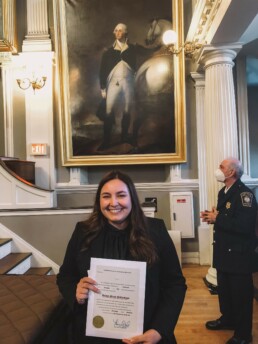How Can Veterans With Mesothelioma Seek Financial Help?
Nearly one-third of all mesothelioma victims in America are veterans, most of whom served in the United States Navy. This heartbreaking statistic is a reality we wrestle with daily. Until the mid-1970s, almost all ships built by the Navy were constructed with materials that contained asbestos–the inhaled fibers of which cause mesothelioma. The closed environment of the ship meant that almost all personnel were in close contact with airborne asbestos particles. Those who served in the Army, Marine Corps, Air Force, Merchant Marines, and Army National Guard also may have been exposed since asbestos was regularly used in the construction and operation of military bases and facilities.
These brave men and women fought for our country and dedicated their service to protecting our freedoms in times of crisis. It is unconscionable that they were routinely exposed to harmful levels of asbestos during the course of their service. If you or someone you know is a veteran diagnosed with mesothelioma, they deserve compensation to help them through this very difficult diagnosis.
There are two main avenues through which veterans can pursue financial help: government benefits and legal claims, and we encourage you to explore both options.
Department of Veterans Affairs (VA) Benefits
The Department of Veterans Affairs is one of the most valuable organizations for veterans diagnosed with mesothelioma. Military service members diagnosed with this disease who can directly tie their diagnosis to their service may be eligible for VA disability compensation, VA pension, VA healthcare, and a number of other benefits. Once diagnosed, we recommend submitting a claim as soon as possible. You can do this yourself, either in person or online, or with the help of a VA Environmental Health Coordinator who can walk you through the claim process and help you gather the evidence you need.
This evidence typically includes supporting documents such as VA medical records and hospital records, private medical records and hospital reports, military service records, and possible supporting statements from family members, friends, or people you served with. You will also need a doctor’s statement linking your mesothelioma diagnosis to your military service. Generally, if you can provide sufficient proof that your mesothelioma is related to your time in the service, you will be granted benefits. While historically this has been easiest for Navy personnel, Army, Air Force, or Marine veterans may still be able to link their diagnosis to their service.
Read more about how to file a VA disability claim, or watch the VA’s disability claims video on YouTube.
Legal Claims Against Asbestos Manufacturers
Following a mesothelioma diagnosis, medical bills can start adding up quickly and insurance and other benefits may not cover the mounting costs. Veterans across Massachusetts who have been diagnosed with mesothelioma deserve compensation for their suffering. Regardless of whether you have begun a claim or currently receive VA benefits, we encourage you to explore the possibility of a legal claim against asbestos manufacturers, which, if successful, can lead to significant financial payouts for you and your family.
The standard of proof required for a successful lawsuit, however, is considerably higher than it is to receive VA benefits. Much more detail is required to fight a case in the courtroom, including proof that specific products were used and specific timelines of exposure. While it may seem daunting to try to pull these pieces together yourself, an experienced mesothelioma lawyer who has won cases for veterans in the past, will know exactly what to look for and understand the legal strategies required to win your case. They will work closely with you and your family to identify the dangerous products you may have worked with and the manufacturers and/or asbestos trust funds that have already been forced to pay compensation to veterans. Typical products that caused asbestos exposure in veterans include:
- boilers
- pumps
- valves
- pipes
- main propulsion turbines
- ship service generators
- galley equipment
- laundry equipment
- deck coverings
- protective equipment
- and more.
Don’t miss out on the compensation you and your family deserve. If you think you might have a mesothelioma case in Massachusetts, we encourage you to reach out to Shepard O’Donnell for a free consultation during which we will evaluate your case and determine if you have a viable claim. We have helped hundreds of individuals and families get justice for their injuries, regularly obtaining settlements and verdicts in the millions. And you will never pay unless we deliver results for you. Read more about the importance of hiring a local law firm for your mesothelioma case.
Note: We pursue compensation from the manufacturers of the asbestos-containing products that injured our veterans, not from the government or the military.
Shepard O’Donnell Named a Top-Tier Personal Injury Law Firm by Best Lawyers® “Best Law Firms” 2024
Shepard O’Donnell, one of the top asbestos personal injury law firms in Massachusetts for 25 years, received top-tier designation in the Best Lawyers® “Best Law Firms” 2024 edition. The firm was ranked “Tier 1” in personal injury litigation and was highly rated in mass tort litigation and class actions. Law firms included in the “Best Law Firms” rankings are recognized for professional excellence and consistently strong ratings from clients and peers. Below are the firm’s complete rankings.
Metropolitan Tier 1 (Boston)
- Personal Injury Litigation – Plaintiffs
Metropolitan Tier 3 (Boston)
- Mass Tort Litigation / Class Actions – Plaintiffs
The Best Lawyers “Best Law Firms” rankings are determined by an exhaustive evaluation process that includes the collection of client and lawyer evaluations, peer review from leading attorneys in their field and review of additional information provided by law firms as part of the formal submission process. To be eligible for a ranking in a particular practice area and metro region, a law firm must have at least one lawyer included in Best Lawyers in that particular practice area and metro. Three Shepard O’Donnell attorneys were recognized in The Best Lawyers in America® 2024 edition.
Erika O’Donnell Receives 2023 “Top Women of Law” Honor
Shepard O’Donnell, one of the top asbestos personal injury law firms in Massachusetts for 25 years, announces that Co-Managing Partner Erika O’Donnell has been named to the 2023 Massachusetts Lawyers Weekly “Top Women of Law” list. This highly competitive honor celebrates the exceptional accomplishments of women attorneys as leaders, educators and mentors. The award also recognizes attorneys for their pro bono, social justice, advocacy and business efforts.
O’Donnell’s practice focuses on asbestos litigation, management of the firm, and more recently, her position as Plaintiffs’ Liaison Counsel in the Massachusetts Asbestos Litigation (MAL) docket. Throughout her nearly 20-year career, she has achieved numerous multi-million-dollar settlements and verdicts in cases involving mesothelioma, lung cancer and other asbestos-related diseases, smoking-related cancers and pharmaceutical drugs and devices. Additionally, O’Donnell is a role model and mentor to other attorneys and paralegals at the firm. In recognition of her many contributions, O’Donnell was named co-managing partner in 2023, and the firm rebranded to Shepard O’Donnell.
“Erika has been an instrumental component of our success, and I can’t think of anyone more deserving of this prestigious honor,” said Founder Michael Shepard. “For the many years I have known her, Erika takes initiative and dives into the complexity of asbestos and toxic tort litigation without hesitation, all while mentoring the next generation of legal professionals. She is everything you want a personal injury lawyer and a partner to be. Congratulations on this amazing achievement!”
As an active member of the Boston legal community, O’Donnell is a member of the Massachusetts Bar Association, the Worcester Bar Association, the Massachusetts Academy of Trial Attorneys and the American Association for Justice. O’Donnell is a founding member of a prestigious national group of female toxic-tort litigators, Women of PALS. In addition to her recognition as a “Top Women of Law,” she has been recognized by Massachusetts Super Lawyers and The Best Lawyers in America.
Massachusetts Lawyers Weekly reports decisions issued by all the state and federal courts in Massachusetts, as well as changes to court rules, verdict and settlement reports, bar-discipline notices, and all other news vital to attorneys in the commonwealth. It also covers hundreds of rulings from state and federal trial courts in Massachusetts.
Mesothelioma Diagnosis, Prognosis, and Treatment Options
MESO Series: Part II
Diagnosis, Prognosis, and Treatment Options
The typical mesothelioma patient is a man around retirement age with a blue-collar or military background. The relatively advanced age of patients is due to the long latency period of this disease, which typically manifests between 20-50 years after exposure to asbestos. Cruelly, it is just as workers are set to enjoy their retirement years, that they are diagnosed with mesothelioma. While workers who have been in close contact with asbestos are at the highest risk, family members can also be at risk via exposure to fibers brought home on the clothing of the primary individual.
If you or someone you know has experienced any of the symptoms outlined in our previous post, we encourage you to seek medical attention right away. It is critical to let your doctor know as early as possible if there’s even a small chance you may have been exposed to asbestos during your working years. If you aren’t currently experiencing any symptoms, but are concerned about possible past exposure, ask your doctor to set up regular monitoring. However, keep in mind that not everyone who has been exposed to asbestos will get mesothelioma or other cancers.
How Do You Diagnose Mesothelioma?
Mesothelioma can be difficult to diagnose because it often looks like other types of cancer, or even benign illnesses such as pneumonia, flu, or intestinal issues. Your doctor will likely use a variety of diagnostic tools, including a physical exam, blood and tissue tests, x-rays and other imaging scans, and biopsies to determine whether or not mesothelioma is present. If mesothelioma is diagnosed, these tests also help determine how far it has progressed and whether it has spread to other parts of the body. The cancer can spread via tissue, the lymph system, or the blood.
The process used to find out if cancer has spread outside the pleura (lungs) or peritoneum (abdomen) is called staging. As with other cancers, there are four stages of the disease. Doctors will ask questions such as: How far has cancer spread in the pleura? Has it spread into other nearby pleura or structures? Can it be removed with surgery? Has the cancer spread to nearby lymph nodes? Has the cancer spread to distant organs, like the bones, liver, lungs, or pleura (lining of the lung) on the other side of the body, or the peritoneum (lining of the abdomen)?
Depending on the answers, pleural mesothelioma, for example, can be divided into four stages:
- Stage 1: Cancer is only in the pleura. At this stage, you may be a candidate for treatments like surgery to remove the cancer.
- Stage 2: Cancer may have spread beyond your pleura, but it’s still near the original site. At this stage, surgery plus chemotherapy or radiation may be indicated.
- Stage 3: Cancer has spread to nearby organs and lymph nodes. A cancer at this stage likely requires aggressive treatment and includes a combination of treatment approaches.
- Stage 4: Cancer has spread to other organs, or metastasized. Aggressive treatment and possibly palliative care is recommended at this stage of the disease.
It is important to know what stage the cancer is in order to plan the correct treatment. For a more detailed breakdown of each stage of pleural mesothelioma, please view the outline on cancer.gov. If you are facing a positive mesothelioma diagnosis, we encourage you to get a second opinion to be certain that your symptoms are indeed associated with mesothelioma.
What Is The Prognosis for Mesothelioma?
According to the National Cancer Institute, the prognosis and treatment options for mesothelioma depends on a number of factors, including the stage of the cancer, the size of the tumor, the patient’s age and activity level, as well as his or her general health, including lung and heart health.
Mesothelioma has historically had a poor prognosis, and the current life expectancy of a patient diagnosed with the disease, with treatment, is around 18-36 months. Treatment for early-stage disease with surgery and radiation can extend a patient’s life expectancy, but many patients either are too ill to undergo aggressive surgery or present with advanced disease. Palliative care remains an important component of the management of this devastating illness.
However, there is some good news. Early detection, advancements in treatment options, as well as new, targeted treatments are cause for optimism, with many patients outliving their prognosis by years.
What Are The Treatment Options for Mesothelioma?
If you have been diagnosed with mesothelioma, you will work closely with a specialist to develop a treatment plan specific to your situation. It is very important to establish strong relationships with a team of experts able to provide support and guidance in all aspects of the management of mesothelioma.
As mentioned, there are four stages of meso with progressively aggressive treatment options, including:
- Surgery
- Radiation
- Chemotherapy
- Immunotherapy
- Targeted therapy
For some patients, taking part in a clinical trial may be the best treatment choice. Clinical trials are part of the cancer research process. Clinical trials are done to find out if new cancer treatments are safe and effective or better than the standard treatment. Detailed information on each of these treatment options is available at cancer.gov. It is important to discuss all available options with your doctor to be sure you’re getting the right treatment for your particular disease.
We are not medical experts and urge you to speak with your doctor or specialist regarding your diagnosis and potential treatment options. Over decades of successfully fighting for financial compensation for mesothelioma victims, we have worked with many excellent specialists in this field and are happy to provide you with a list of local mesothelioma medical experts.
Contact Us For Help
You and your family are undoubtedly experiencing emotional stress and trauma as you deal with this painful time in your lives. Make sure you find an attorney for whom you are not just a number on a spreadsheet or a docket. We are responsive, compassionate, and sincere.
If you think you might have a mesothelioma legal case in Massachusetts, we encourage you to reach out to us. We have helped hundreds of individuals and families get justice for their injuries, regularly obtaining settlements and verdicts in the millions. We are happy to offer you a free case evaluation. If you like, we will come to your house to listen to your story and will tell you honestly if we think you have a viable claim.
_____________________________________________
For more information on mesothelioma and its various treatment options, including some new targeted therapies, please read Mesothelioma: a Review by Frank E. Mott, MD, FACP on the National Library of Medicine website.
Detailed stages:
[from https://www.cancer.gov/types/mesothelioma/patient/mesothelioma-treatment-pdq#_50]
For more on the stages: https://www.cancer.org/cancer/types/malignant-mesothelioma/detection-diagnosis-staging/staging.html
https://www.ncbi.nlm.nih.gov/pmc/articles/PMC5571821/
https://my.clevelandclinic.org/health/diseases/15044-pleural-mesothelioma
What is Mesothelioma?
Mesothelioma Series: Part I
What is Mesothelioma?
We’ve all seen the commercials about mesothelioma on TV, but unless it has affected us personally, few of us know what mesothelioma is and how devastating this disease can be for individuals and their families.
Mesothelioma is an insidious disease with a long latency period, meaning it often takes decades to develop—typically 20-50 years from initial exposure. It is a form of cancer that affects the mesothelium, the lining that protects the lungs, abdomen, heart, and other major organs in the body. A malignant tumor of the mesothelium is called a malignant mesothelioma, often shortened to simply, mesothelioma. There are four main types of mesothelioma:
- Mesothelioma of the lungs: the most common form of mesothelioma affecting about 80% of patients, is called pleural mesothelioma.
- Mesothelioma of the abdomen: known as peritoneal mesothelioma.
- Mesothelioma associated with the heart: called pericardial mesothelioma, referring to the pericardial cavity around the heart.
- Less common forms of the disease (less than 1% of cases) are papillary and testicular mesothelioma, affecting the ovaries and testicles.
A mesothelioma diagnosis is a life-changing event with emotional, physical, and financial consequences. Learn more about the medical aspects of mesothelioma at the American Cancer Society and the American Lung Association and read more about diagnosis and treatment options here.
How Do You Get Mesothelioma?
The only known cause of mesothelioma is exposure to asbestos.
Asbestos is a naturally occurring fibrous mineral that is both durable and fire-proof and has been used for decades in the manufacture of various commercial and industrial products, including textiles for clothing. Asbestos was first used in construction in the mid-1800s, and it was as early as the 1930s that harmful effects associated with its use were first documented. It wasn’t until 1989, however, that the EPA announced it would phase out the use of asbestos in almost all products in the U.S., but by that time, millions of workers had been exposed.
Asbestos fibers create dust or powder when handled, which is then inhaled or ingested during a workday. These fibers can lodge in internal organs, leading to the development of tumors. Workers across a range of industries have been exposed regularly to asbestos-containing materials, including those in:
- Shipping
- Plumbing
- Construction
- Aircraft Maintenance
- Auto Shops
- Paper Mills
- Pipefitting
- Powerhouses
- and other workplaces
Unfortunately, many individuals diagnosed with mesothelioma are Veterans.
Common products used and handled during a typical workday include:
- Construction materials such as sheetrock and wallboard
- Roofing, shingles, and siding
- Flooring and tiles
- Pipe covering and insulation
- Electrical cables and wire
- Boilers, pumps, and generators
- Gaskets, valves, and packing material
- Rope, wick, and cord
- Protective clothing and textiles
- Automotive materials such as brake pads and transmission plates
- Adhesives, cement, and sealants
- Raw asbestos
Despite the early warnings, manufacturers and installers of these materials continued to sell and install asbestos products for decades without warning workers of the terrible dangers they faced. The EPA estimates that from 1940 to 1980, 27.5 million Americans were exposed to asbestos at work. While those exposed at work are at the highest risk, family members can also be at risk via exposure to fibers brought home on the clothing of the primary individual.
What Are The Symptoms of Mesothelioma?
Mesothelioma develops years, often decades, after the initial asbestos exposure. Since many of the symptoms are similar to other less dangerous illnesses, such as pneumonia, flu, or intestinal issues, it often goes undiagnosed until it has reached the later stages of the disease.
Symptoms can vary based on where the tumor is located and at what stage the cancer is but can include:
Pleural mesothelioma (lungs)
|
Peritoneal mesothelioma (abdominal)
|
Pericardial mesothelioma (heart)
|
If you or someone you know is experiencing any of these symptoms we strongly encourage them to seek medical advice, especially if you suspect they’ve been exposed to asbestos in their lifetime.
Stay tuned for the next installment of our blog series on mesothelioma, which focuses on the diagnosis, prognosis, and treatment options for this disease.
Contact Us For Help
Companies that knowingly perpetuated the use of this harmful material for decades after it was determined dangerous should be held accountable. If you think you might have a mesothelioma case in Massachusetts, we encourage you to contact us. We have helped hundreds of individuals and families obtain justice for their injuries, regularly reaching settlements and verdicts in the millions. We are happy to offer you a free case evaluation. If you like, we will come to your house to listen to your story and will tell you honestly if we think you have a viable claim.
Michael Shepard Quoted in Law360 article on Asbestos Claims
Michael Shepard’s insights were featured in Law 360’s article, “Mass. Lawmakers Weigh Ending Asbestos Claims Time Limit.”
“The Massachusetts Legislature is eyeing a sweeping change to the state’s construction tort statute of repose by eliminating an ironclad six-year limit on certain construction-related asbestos claims, something proponents say would fix a “draconian” interpretation of the law that leaves many families without legal options.”
Michael Shepard Law 360 , “The statute of repose was never designed to insulate companies that knowingly and intentionally used a toxic product … knowing that product won’t cause an injury to people until after the statute of repose has expired,” said Mike Shepard of Shepard O’Donnell, whose firm represented the Oliver estate before the SJC in a suit against General Electric and Metropolitan Life Insurance.
“A company like GE could install asbestos products today and be fully free, because no one will get an injury within the statute of repose time frame. It takes decades for your injury to manifest,” Shepard added. “We don’t see any downside to changing this law.”
Three Shepard O’Donnell Attorneys Recognized in The Best Lawyers in America® 2024
BOSTON, MA, August 21, 2023 –Shepard O’Donnell, one of the top asbestos personal injury law firms in Massachusetts for 25 years, announces that three of its attorneys were selected for inclusion in The Best Lawyers in America® 2024 edition. Published by Woodward/White, Inc., Best Lawyers is considered by many to be the oldest and most respected peer-reviewed publication in the legal profession.
Founder Michael Shepard was recognized in the Personal Injury Litigation – Plaintiffs practice area. Co-Managing Partner Erika O’Donnell was recognized in the Personal Injury Litigation – Plaintiffs and Mass Tort Litigation / Class Actions – Plaintiffs practice areas.
Partner Michael McCann was recognized in Best Lawyers: Ones to Watch® category in the Personal Injury Litigation – Plaintiffs and Mass Tort Litigation / Class Actions – Plaintiffs practice areas. The “Ones to Watch” designation recognizes lawyers for outstanding professional excellence who are earlier in their careers.
Inclusion in The Best Lawyers in America is based on an extensive peer-review process designed to capture the consensus opinion of leading lawyers about the professional abilities of their colleagues within the same geographical and legal practice area. Best Lawyers has been published since 1983 and highlights the top 5% of practicing attorneys in each practice area. Its 2024 selections are featured in the 30th edition of The Best Lawyers in America.
“Would-be mom sues cryogenic storage center over ‘lost’ eggs”- Michael Shepard Quoted
Michael Shepard was quoted in the Massachusetts Lawyers Weekly article, “Would-be mom sues cryogenic storage center over ‘lost’ eggs.”
“She tried to have her eggs preserved with the expectation that she would be able to use them later on when she was ready to have a child,” says the plaintiff’s attorney, Michael C. Shepard of Shepard O’Donnell in Boston. “After going through this incredibly stressful and invasive process, she wasn’t able to have her own child later on due to the negligence of the company she contracted with and their partner.”
“I can’t even imagine what that phone call was like,” Shepard says. “When you have nothing but the highest hopes of having a child and having that child be part of your family line, then being told, ‘Sorry, it didn’t work out’ — it must have been crushing for her.”
Why We Still Need to Worry About Asbestos
Authored by Kelsey McCandless
“So, what do you do?”
Whenever I answer this question and people learn that I work in a law firm specializing in asbestos litigation, I get a lot of curious looks and questions.
I am often asked why I decided to pursue this type of law and why our firm’s work is important to me, especially when “asbestos isn’t even an issue today.” It seems that, for most people, there is no question that asbestos is dangerous and that asbestos exposure can cause cancer, so they often think the work we do should be easy. The reality, however, is more complex.
It is tempting to dismiss asbestos as a problem of the past. For most of the 1900s, asbestos was widely used in construction materials in the United States because of the fiber’s strength and fireproofing properties. Despite the positive features of asbestos’s durability, scientists soon discovered that the fibers posed a health risk to those exposed. By the mid-1930s, researchers already believed in a link between asbestos fibers and life-threatening respiratory ailments, including mesothelioma, lung cancer, and asbestosis. By the 1970s, the hazardous effects of asbestos exposure were widely known and well documented.
In the decades since the initial discoveries of the harmful effects of asbestos exposure, the use of the fiber in building materials has decreased significantly in the U.S.; however, it has never been federally banned. Additionally, even after the dangers of asbestos became broadly known, some companies continued to use products that contained asbestos and failed to protect their workers from exposure.
Americans continue to feel the effects of the past widespread asbestos use today, as the fibers can take decades to cause health consequences after exposure. The time between first exposure and the development of the disease is estimated to fall between 10 and 50 years. Even 30 years after peak asbestos use in the United States, around 3,000 people are diagnosed with mesothelioma yearly. We have seen this firsthand with our clients.
Modern consumers are also at risk of being exposed to asbestos-contaminated products produced today. For example, earlier this year, Johnson & Johnson stated that it would end the worldwide sale of talc-based Johnson’s Baby Powder in 2023 due in part to discoveries that the product had been contaminated with asbestos into the 2000s. In addition, as recently as 2019, the Food and Drug Administration found the mineral fibers in several makeup products from the retailer Claire’s.
Despite these revelations and the science-backed research that asbestos causes cancer, there is an ongoing debate in the courtroom about whether and how much asbestos is dangerous. Corporate defendants routinely hire experts to testify that plaintiffs’ exposures to asbestos are not significant enough to contribute to their mesothelioma. They purposefully design defense strategies that manipulate dust disease science to avoid legal liability for the injuries their products cause to workers, consumers, and their family members.
When so many people assume asbestos is not a threat anymore, knowing the reality can be disheartening. This is why the work we do has meaning for me. When our clients and their family members contact us for help, we empathize with their pain and frustration and do whatever it takes to hold bad actors responsible for harming them.
Our clients are gravely ill due to no fault of their own and suffer from cancer caused by the irresponsibility of companies that did not value workers and their families. Fighting for them is what this work is all about.
Shepard Law Announces New Firm Leadership and Changes Name to Shepard O’Donnell
Shepard Law Announces New Firm Leadership and Changes Name to Shepard O’Donnell
Shepard Law, one of the top asbestos personal injury law firms in Massachusetts for 25 years, announces that longtime firm attorney, Erika O’Donnell, was appointed co-managing partner to run the firm alongside founder, Michael Shepard. In conjunction with the leadership change, the firm also rebranded to Shepard O’Donnell.
O’Donnell has been a key member of the Shepard Law team since 2005, when she joined the firm as an associate. Over nearly two decades, she has achieved numerous multi-million-dollar settlements and verdicts in cases involving mesothelioma, lung cancer and other asbestos-related diseases, smoking-related cancers and pharmaceutical drugs and devices. Additionally, she is a role model and mentor to other attorneys and paralegals at the firm. In recognition of her many contributions, O’Donnell was elevated to equity partner in 2019.
“Erika has worked beside me for many years, helping to build a talented, compassionate legal team,” said Shepard. “She is a fearless advocate for our clients and is a tireless fighter for them and their families. Erika is everything you want a personal injury lawyer to be, and I’m thrilled to have her lead the firm with me.”
O’Donnell’s roots growing up in a blue-collar family from Worcester, Massachusetts steered her toward a career helping sick and injured workers get the compensation they deserve for their illnesses. The opening of the firm’s second office in Worcester in 2017 allowed O’Donnell to return to her hometown and help other local families in that community. She is active in the Worcester Bar Association and is a founding member of a prestigious national group of female toxic-tort litigators. O’Donnell is highly respected by both colleagues and adversaries in the litigation field.
“As the firm celebrates its 25th anniversary, it is an honor to take on this expanded role,” said O’Donnell. “I’ve always believed it is important to hold large corporations and businesses accountable for their wrong-doings. And, with the personal injury legal sector in Massachusetts becoming more crowded with so-called ‘national firms’ looking to take mesothelioma cases, it’s equally important for clients to understand that having responsive, compassionate and sincere counsel that understands the local court system and who lives and works in the same state is crucial to success. At Shepard O’Donnell, we treat our clients the way we would want to be treated if we were in their shoes.”
Shepard Law made headline news in October 2018 with its victory in the Summerlin v. Philip Morris USA, et al. case (No. 1581CV05255, Mass. Super., Suffolk Co.)—a notable case that brought co-defendants from an asbestos product company and a cigarette manufacturer to trial before a jury. After a five-week trial before the Suffolk Superior Court in Boston, Shepard Law secured a $43 million verdict on behalf of their client. O’Donnell was involved in representing the case on behalf of the Summerlin family.
In addition to the Summerlin case, O’Donnell was involved with an asbestos mesothelioma case involving a chemical engineer who was exposed to asbestos at a large plant in Springfield, Massachusetts. That case was notable in that she was able to successfully identify and bring suit against many defendants that had never been sued before in Massachusetts for their asbestos-containing products. In 2018, O’Donnell also successfully litigated a case involving a client who worked spraying asbestos insulation in buildings as a teenager, and later developed mesothelioma as an adult in his 60s.
O’Donnell is a member of the Massachusetts Bar Association, the Worcester Bar Association, the Massachusetts Academy of Trial Attorneys, and the American Association for Justice. She has been recognized by Massachusetts Super Lawyers since 2012.























